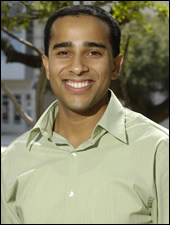Posted on February 5, 2010 by Christi Fish

Rajesh Bhargave
 While most people will agree that it feels like time is passing them by, according to UTSA marketing professor Rajesh Bhargave the perception of the passage of time is variable.
While most people will agree that it feels like time is passing them by, according to UTSA marketing professor Rajesh Bhargave the perception of the passage of time is variable.
Bhargave’s co-authored research in the area of time perception was recently published in Psychological Science and appeared in the New York Times .
“We looked at why events or activities from the past were perceived as more recent or more distant, even when they occurred at around the same time,” said Bhargave, assistant professor of marketing at the UTSA College of Business. “Why does the sensation of the passing of time differ?”
According to his research findings, “a time interval that is punctuated by a greater number of accessible intervening events related to the target event (event markers) will make the target event feel more distant.”
For instance, the time since a child’s birth is marked regularly by subsequent, related events such as birthdays, child development, etc. So, the child’s birth would feel more distant when these markers are brought to mind. On the other hand, for events with fewer markers such as the death of a celebrity, the time since the event would have less markers and the event itself would feel more recent.
“Time perception provides a crucial input into consumer’s behavior, and these findings have a direct impact for marketers,” said Bhargave, who received his doctorate from the Wharton School at the University of Pennsylvania. “By creating event markers for a triggering incident, such as a gift made to a charity, or a visit to a hotel or restaurant, marketers can help determine how consumers perceive the time since the event.”
Please send your comments to: wendy.frost@utsa.edu


